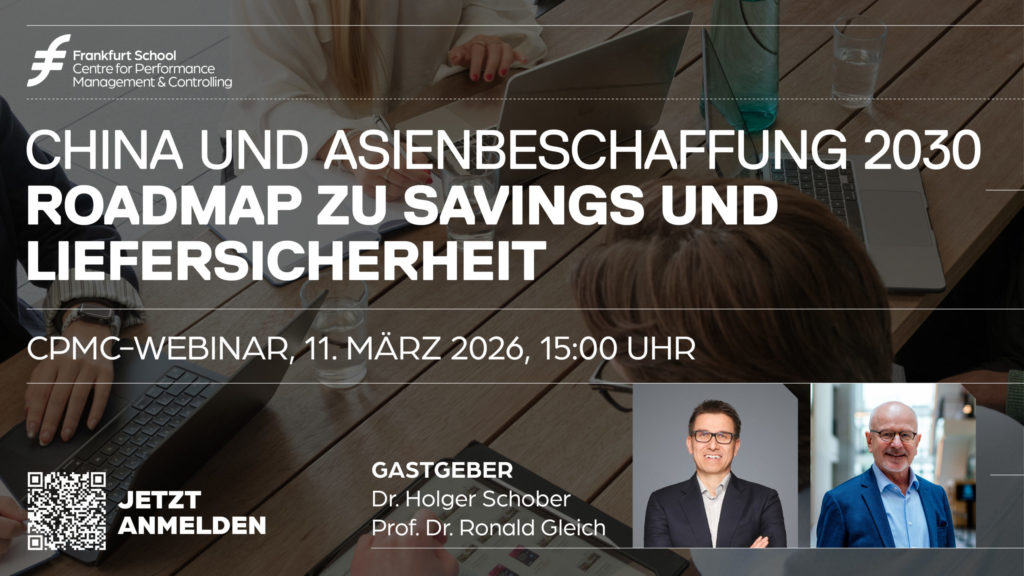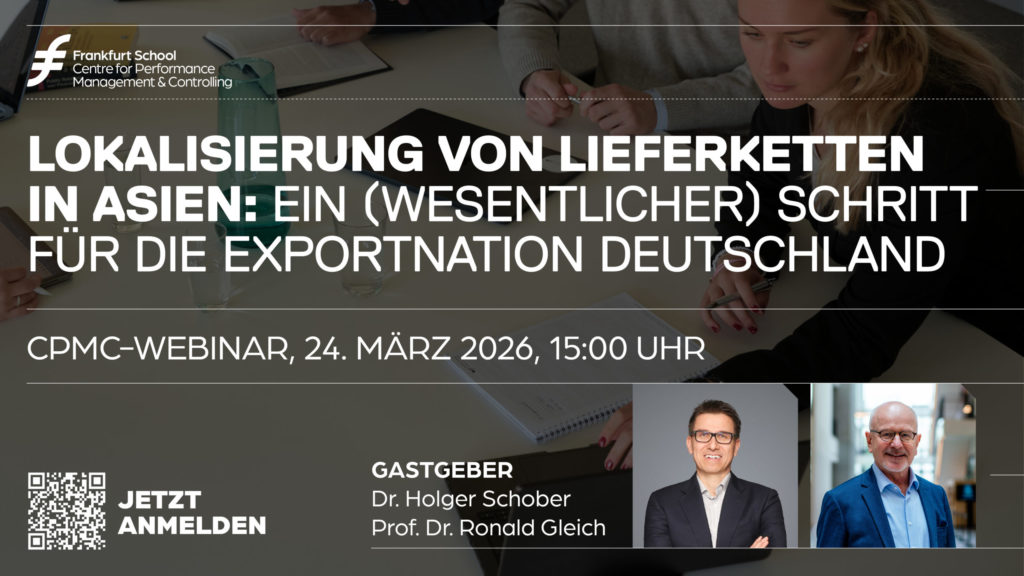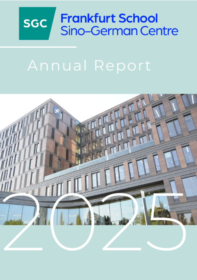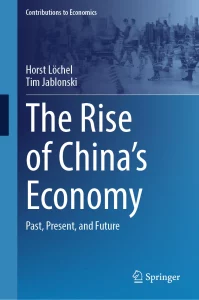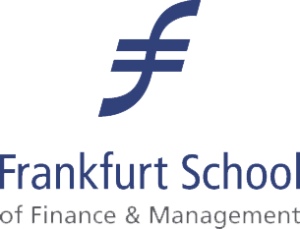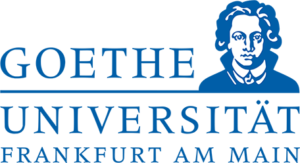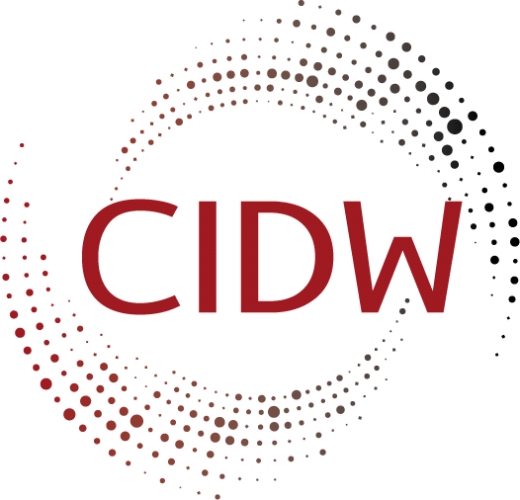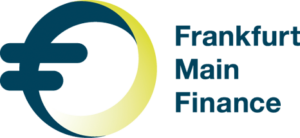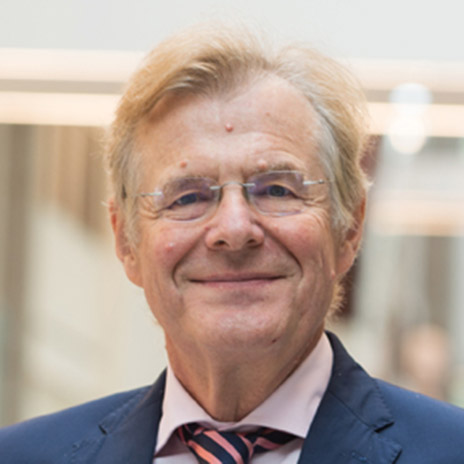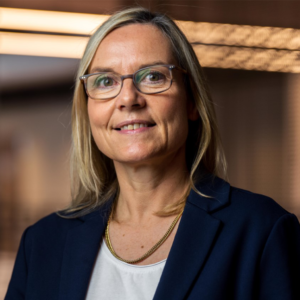Virtual Roundtable
THE OUTLOOK FOR CHINA’S ECONOMY IN 2026 AND THE 15TH FIVE-YEAR PLAN
February 5th, 2026, 11:00 a.m. to 12:00 p.m. CET.
Speakers:
-
Dr. Julia Haes, Managing Director, China Institut für die deutsche Wirtschaft (CIDW)
-
Dr. Yi Xiong, Chief Economist, China at Deutsche Bank AG
Moderator: Prof. Horst Löchel, SGC at Frankfurt School
China Webinars of the Frankfurt School Centre for Performance Management & Controlling
Happy Lunar New Year

News
Die Aussichten der chinesischen Volkswirtschaft im Jahr des Feuerpferdes
ChinaTable
(4. Februar 2026)
Interview CGTN Europe How is Germany Rethinking its Trade Policy with China? (17. November 2025)
Interview Frankfurter Allgemeine Zeitung Wir brauchen einen Neustart mit China
(14. November 2025)
China Decoded
Brücken bauen in der Welt: Potenziale deutsch-chinesischer Wirtschaftskooperation im Bauwesen
(13. November 2025)
China Decoded
Digitaler Yuan: Bisher nur verhaltende Verbreitung in der Bevölkerung
(16. October 2025)
Interview China Daily
EU’s anti-subsidy investigation against China
(24. September 2025)
The Sino-German Center of Finance and Economics (SGC) at Frankfurt School of Finance & Management is a registered association since 2015. It emerged from the RMB initiative of the Government of Hessen to position the financial center of Frankfurt as RMB offshore hub. The Center conducts independent and relevant research in the field of economic and financial affairs between Germany respectively Europa and China and serves as a forum for dialogue among academics and professionals of both countries
Research and Projects
A cooperation between Frankfurt School and the Gesellschaft für Internationale Zusammenarbeit (GIZ)

Work Report on Central Bank Digital Currency in China Funded by the Deutsche Gesellschaft für Internationale Zusammenarbeit (GIZ)
For some time now, central banks around the world have been developing Central Bank Digital Currencies (CBDCs) and working to introduce them into both national and international markets. The background to this is the rapidly growing use of digital payment methods offered by private providers, which is diminishing the influence and controllability of traditional, government-issued cash.
A pioneer in this field is the People’s Bank of China (PBoC), which began piloting the digital yuan (e-yuan) as early as 2018. For the European Union (EU), and thus also for Germany, it is important to understand China’s progress—particularly in the context of international developments such as the Belt and Road Initiative—and to draw relevant conclusions for its own development efforts.
To contribute to building knowledge in Germany about the key emerging economy China in alignment with the United Nations Sustainable Development Goals for global partnership, a publication will be created that examines the development of digital central bank money in China from a perspective relevant to Europe and Germany and compare it with the development of the digital euro.
The following questions will be central to the report and will be explored using the example of the e-yuan:
- How does traditional cash differ from digital central bank money as legal tender?
- How does digital central bank money change monetary policy, and what role do Chinese commercial banks play?
- What technologies does the PBoC use to promote the e-yuan?
- What are the advantages and disadvantages for consumers, and what risks exist in terms of data protection?
- How is China using digital central bank money in international payments?
- How has the e-yuan developed within China, and what does this mean for future development perspectives of digital central bank money?
- What are the differences and similarities between the e-yuan and the digital euro?
The project is initially set to run until the end of 2025.
Arbeitsbericht zum digitalen Zentralbankgeld in China
Gefördert von der Gesellschaft für Internationale Zusammenarbeit (GIZ)
Seit geraumer Zeit sind internationalen Zentralbanken dabei, digitales Zentralbankgeld (engl. Central Bank Digital Currency – CBDC) zu entwickeln und im nationalen wie internationalen Markt zu platzieren. Hintergrund ist der rasch wachsende Einsatz digitaler Zahlungen durch private Anbieter, die den Einfluss und die Steuerbarkeit des traditionellen, staatlichen Bargeldes schmälert.
Vorreiter ist die chinesische Zentralbank, People’s Bank of China (PBoC), die bereits im Jahr 2018 in Pilotprojekten den digitalen Yuan (e-Yuan) in Umlauf gebracht hat. Für die Europäische Union (EU) und damit auch für Deutschland, ist es wichtig die chinesischen Fortschritte auch und gerade im Hinblick auf internationale Entwicklungen wie beispielsweise das Seidenstraßen Projekt zu verstehen und entsprechende Schlüsse für die eigene Entwicklung abzuleiten.
Um einen Beitrag zum Wissensaufbau in Deutschland zu China als wichtiger Akteur in der internationalen EZ im Einklang mit den ‚Sustainable Development Goals‘ der Vereinten Nationen für globale Partnerschaft zu leisten, soll eine Publikation erstellt werden, die die Entwicklung des digitalen Zentralbankgeldes im relevanten Schwellenland China unter für Europa und Deutschland relevanten Gesichtspunkten untersucht und mit der Entwicklung des digitalen Euros vergleicht.
Folgende Fragen sollen bei der Ausarbeitung im Vordergrund stehen und am Beispiel des e-Yun herausgearbeitet werden:
- Was unterscheidet traditionelles Bargeld vom digitalen Zentralbankgeld als gesetzliches
Zahlungsmittel? - Wie verändert digitales Zentralbankgeld die Geldpolitik und welche spielen die chinesischen Geschäftsbanken
- Welche Technologien wendet die PBC bei der Verbreitung des e-Yuan?
- Welches Vor- und Nachteiler haben die Verbrauchen und welche Risiken bestehen im
Datenschutz? - Wie setzt China digitales Zentralbankgeld im internationalen Zahlungsverkehr ein?
- Wie hat sich der e-Yuan in China entwickelt und was bedeutet dies für die weiteren
Entwicklungsperspektiven digitale Zentralbankgeldes - Welche Unterschiede und Gemeinsamkeiten bestehen zwischen dem e-Yuan und dem digitalen Euro?
Das Projekt läuft zunächst bis Ende 2025.
Working Papers

New Working Paper: Great Power Rivalry in the 21st century: China vs. the United States: A Game-Theoretic Analysis of the Thucydides Trap (December 2024)
Working Paper: Great Power Rivalry in the 21st century: China vs. the United States: A Game-Theoretic Analysis of the Thucydides Trap (December 2024)
Working Paper: Germany’s Import Dependency on China (September 2023)
Working Paper: The Impact of Population Ageing
on China’s Growth
(December 2022)
White Paper: CVC As A aTool for Global Technological Leadership in China
Working Paper: The Long-Term Development of the Business Conditions for European Companies in China, December 2021
Working Paper: The Benefits of China Depository Receipts – Evidence from Developed Economies, December 2020
Working Paper: Features of Chinese Financial Investors in Europe – Peer-Group Analysis, February 2020
Working Paper: Inclusive Finance in the Rural Areas of China, December 2019
Working Paper: Chinese Direct Investments in Germany, October 2019
Virtual Roundtables
Virtual Roundtable
WHAT DO CHINESE PEOPLE THINK ABOUT GERMANY?
December 11nd, 11.00 am to 12.00 pm
Speakers:
- Dr. Christoper Beier, Assistant Lecturer, University Bonn
- Martin Hansen, Regional Director East Asia, Deutsche Gesellschaft für Internationale Zusammenarbeit (GIZ) GmbH
Moderator: Prof. Horst Löchel
Virtual Roundtable
THE INTERNATIONALISATION OF THE RENMINBI
IN A CHANGING GEOPOLITICAL ENVIRONMENT
September 2nd, 11.00 am to 12.00 pm
Speakers:
- FAN, Shilei, Chief Representative – People’s Bank of China, Frankfurt Representative Office
- Dr. Johannes Petry, Principal investigator, State Cap Finance Project J. W. – Goethe University
Moderator: Prof. Horst Löchel
Virtual Roundtable
What China Policy Does Germany Need?
12. Juni 2025, 11.00 a.m. to 12.00 p.m. CEST Speaker: Frank Sieren, Leading China Specialist and German Bestseller Author Moderator: Prof. Horst Löchel
Konferenz
KONFERENZ ZU WIRTSCHAFTLICHER SICHERHEIT UND MARKTREGULIERUNG
Europa-Institut, FS FCCR und FS SGC 13. Juni 2025, 9.30 a.m. to 12.30 p.m. CEST Ort: Frankfurt School
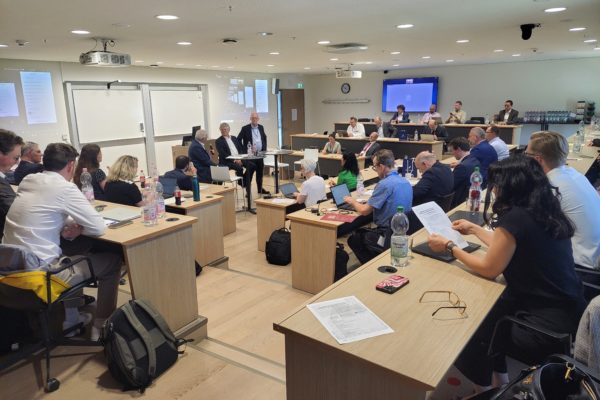
Virtual Roundtable
DeepSeek and the Race to the Technological Frontier
27. March 2025, 11:00 a.m. – 12:00 p.m. CET
Speakers:
- Dr. Thomas Asikis, Deep Learning Engineer at Aisot Technologies and Postdoc at University Zurich.
- Prof. Shenglin Ben, Dean, Zhejiang University International Business School (ZIBS)
- Prof. Lucas Böttcher, Assistant Professor of Computational Science at Frankfurt School of Finance & Management.
Moderators: Prof. Horst Löchel, Prof. Rüdiger von Rosen
Virtual Roundtable
Perspectives of Germany’s China Policy After the Election
24. February 2025, 11:00 a.m. – 12:00 p.m. CET
Speakers:
- Maximilian Butek, Chief Representative of the Delegation of German Industry and Commerce Shanghai
- Dr. Nadine Godehardt, Senior Associate Asia, German Institute for International and Security Affairs (Stiftung Wissenschaft und Politik)
- Christian Sommer, CEO & Chairman at German Centre Shanghai
Moderators:
- Prof. Horst Löchel
- Prof. Rüdiger von Rosen
Webinar in the press :
Virtual Roundtable
Outlook for China’s Economy in the Year of the Snake
14. January 2025, 11:00 a.m. – 12:00 p.m. CET
Speakers:
- Dr. Julia Haes, Managing Director, China Institut für die Deutsche Wirtschaft (CIDW)
- Dr. Yi Xiong, Chief Economist, China, Deutsche Bank
Moderators:
- Prof. Horst Löchel
- Prof. Rüdiger von Rosen
Webinar in the Press:
WEBINAR
The Financial Centres of Hong Kong and Frankfurt
November 14, 11:00 a.m. to 12:00 p.m. CET Speakers:
- Dr. King Au, Executive Director, HK Financial Services Development Council
- Andreas Glänzel, Managing Director, Frankfurt Main Finance e.V.

WEBINAR
The New Normal: Changing Business Conditions for German Companies in China:
September 20, 11:00 a.m. to 12:00 p.m. CEST Speakers:
- Maximilian Butek, Executive Director & Board Member, German Chamber of Commerce in China, Shanghai
- Christian Sommer, CEO & Chairman, German Centre for Industry and Trade Shanghai and Taicang

WEBINAR
Germany’s New China Strategy: What to Expect?
July 31, 2023, 11:00 am – 12:00 pm CEST. Speakers:
- Prof. Klaus Mühlhahn, President, Zeppelin University
- Dr. Michael Schaefer, former German Ambassador in China (retired)
Moderator: Prof. Horst Löchel, Co-Chairman, Sino-German Center at Frankfurt School of Finance & Management
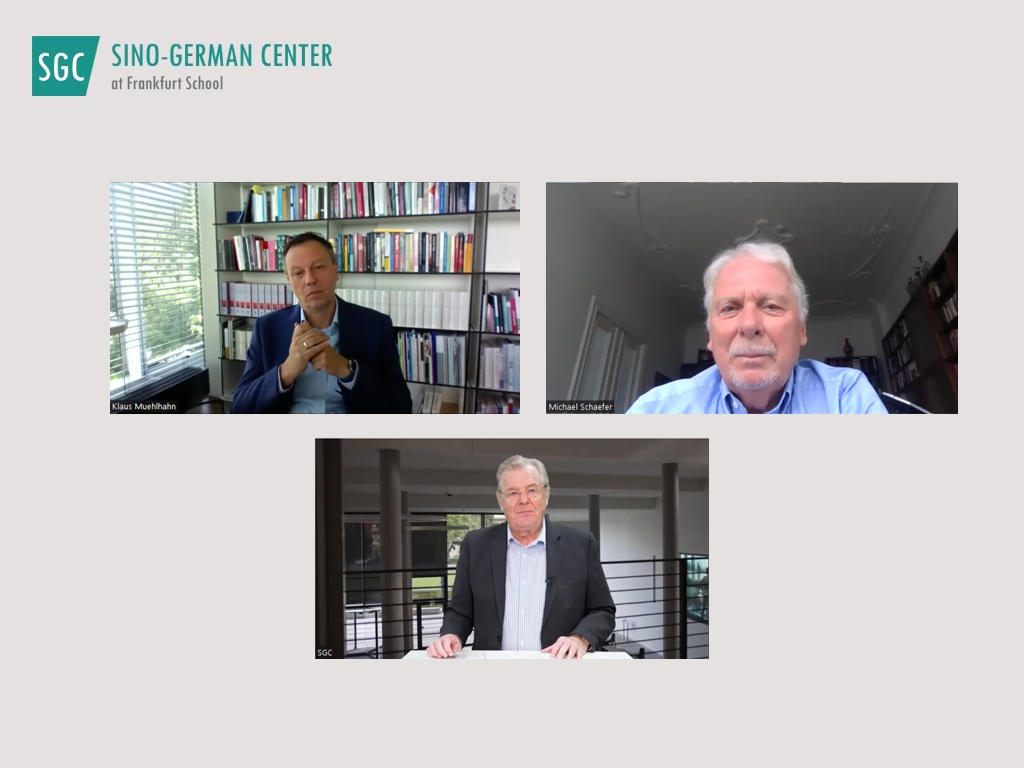
Webinar
(Corporate) Venture Capital in China as a Tool for Driving Innovation
- Robby Xu, Senior Vice President Marketing at MojiaBio, former MD Richland Capital and former Head of Open Innovation & CVC, APAC at Covestro
- Yang Zhong, Head of Asia Open Innovation at British American Tobacco
Tuesday 13 June 2023, 11:00 to 12:00 CEST

Webinar
AIIB: A Multilateral Development Bank
With Ludger Schuknecht, Vice President and Corporate Secretary, Asian Infrastructure Investment Bank (AIIB)
Tuesday 2 May 2023, 11:00 CEST

Webinar
14th National People’s Congress: Government change will impact on the Economy
Wednesday, 1 March 2023, 11:00 a.m. CET With Jörg Wuttke, President of the EU Chamber of Commerce in China
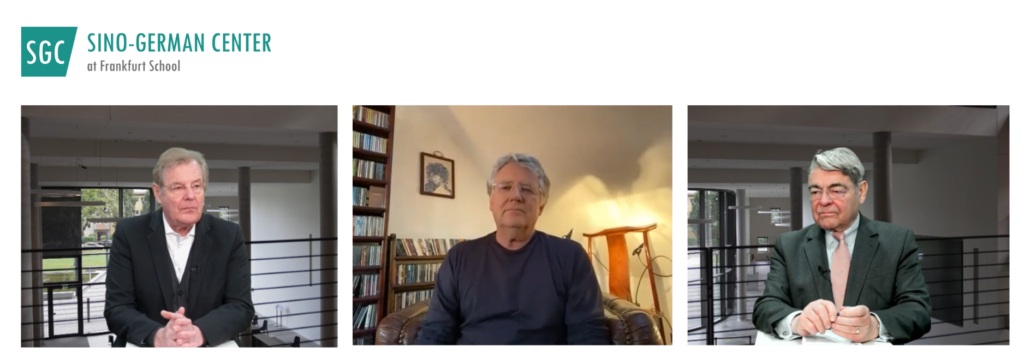
Webinar | How Dependent is German Business on China? (18 January 2023)

Webinar | China Outlook 2023 : Economy and Markets (06 December 2022)
Webinar | Decoding the 20th Congress of China’s Communist Party – What Does it Mean for Business? (20 October 2022)
Webinar | China’s Zero Covid-19 Policy and the Future of European Business in China (31 May 2022)
Webinar | Business Under Lockdown Conditions in the Greater Area of Shanghai (26 April 2022)
Webinar | Asset Management in China (29 March 2022)
Webinar | The Year of the Tiger: What to Expect from China’s Economy and Financial Markets (15 Feb 2022)
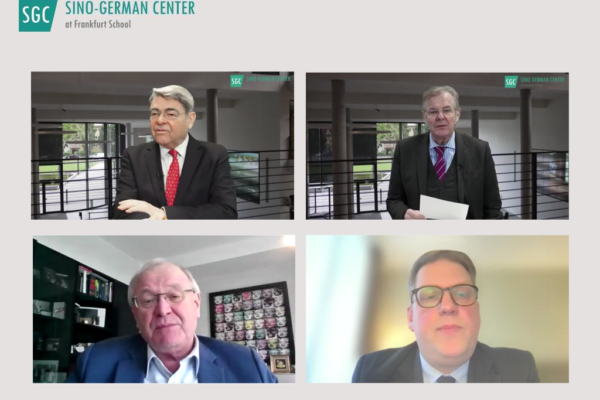
WRAP UP: ECONOMIC OUTLOOK CHINA 2022
At the recent webinar of the Sino-German Center at Frankfurt School all speakers expressed still an optimistic view on the outlook of China’s economy in 2022 despite all challenges. Werner Steinmüller, former Member of the Management Board Deutsche Bank AG and CEO Asia Pacific, stresses especially the rising middle class in China as a strong potential for still high growth rates in the future. He also welcomes the ongoing opening of China’s banking and capital markets, for instance, the relaxed restrictions for the business of foreign investment banks in China. Also, China’s stock and bond market become more and more integrated with the global markets and probably have a bright future, especially in the ‘post-Covid-19’ time. In this context he stresses the importance of stock and bond market connects of China’s capital markets as well as Hong Kong as a leading international financial center. As already the fourth largest international currency in terms of clearing, the future of the Chinese Yuan looks promising as well.
Andreas Hube, Global Vice President, Head of Greater China Liaison Office at SAP, expressed in reference to the recent business confidence study of the German Chamber of Commerce in China his personal view that there are still a lot of opportunities for international and Germany companies in their business with and in China. He sees the fields of sustainable energy and digital economy as most promising and stresses the need that German companies must stay competitive with Chinese companies not only in China but also in the global markets. Within China he predicts a ‘localisation 2.0’ for foreign and Germany companies in the face of rising regulatory and compliance requirements. He sees China’s new policy of technological ‘self-reliance’ and ‘dual circulation’ as an opportunity for the business of foreign companies in China in the short run but as a challenge in the medium and long-term, especially in terms of competition with Chinese companies.
At the beginning of the webinar, Horst Löchel, Professor of Economics at Frankfurt School and Co-Chairman of the Sino-German Center, provides a short outlook of China’s macro economy in 2022. In line with other experts, he predicts a growth rate of 4.5 to 5. 5 %, which is still high compared to advanced economies and given that China is already the second largest economy of the world. However, domestic and international downside risks have increased in recent times, but Chinese policy had made clear that they are ready to act if necessary. Domestic challenges are mainly the descaling of the property sector, further power crunches, weakening consumption, and tighter epidemic controls, whereas the international risks include a sluggish world economy with less trade, further supply chain disruptions, capital outflows due to rising interest rates in advanced economies and finally rising political tensions. In the face of such challenges, it seems that China’s policy makers will switch to a more expansionary fiscal policy in 2022 and continue with a moderate supporting monetary policy as well.
If you interested in more, please watch the record of the webinar at our webpage.
MOU Signatur Ceremony | Sino German Center and Zhejiang University International Business School (16 Feb 2022)
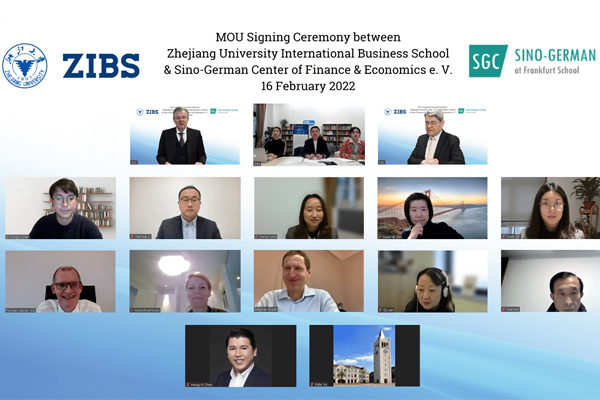
The Sino-German Center e. V. (SGC) at Frankfurt School of Finance & Management signed a Memorandum of Understanding (MOU) with Zhejiang University International Business School (ZIBS) on February 16, 2022. In the MOU both parties agreed for cooperation in the areas of research, faculty and students exchange, executive education as well as conferencing.
In their respective speeches, the Co-Chairman’s of the SGC, Prof. Horst Löchel and Prof. Rüdiger von Rosen, expressed their gladness to cooperate with such a prestigious academic partner in China. Also, the two other board members of the SGC, Dr. Stephan Bredt, Director General Economic Sector, Financial Services, Exchanges of the Ministry of Economic Affairs of the State of Hessen, and Thorsten Giehler, Country Director China of the Gesellschaft for Internationale Zusammenarbeit (GIZ), showed their confidence that the new partnership will become a great success.
The delegation from ZIBS was headed by the Dean, Prof. Shenglin Ben, who focused in his speech on the importance of cooperation’s between academic institutions from China and Germany in challenging times. Joana Rosenkranz, head of the International Office at Frankfurt School, Joined the ceremony as well.
Upcoming Events
Virtual Roundtable
Extra Duty on Chinese EV Imports – Right or Wrong Decision by the EU?
26. November 2024
Speakers:
- Dr. Cora Francisca Jungbluth, Senior Expert China and Asia-Pacific, Bertelsmann Stiftung
- Bernhard Weber, Member of the Board of Directors, China-Network Baden-Württemberg
Moderators: Prof. Horst Löchel, Prof. Rüdiger von Rosen
Virtual Roundtable
The US Presidential Election and the Future of the US-China Relations
November 6th, 11:00 to 12:00 CET
The outcome of the presidential election in the United States will strongly influence the future of US-China relations in political and economic terms. The decision is also decisive for the prospective policy of the EU in China.
Discussion with:
- Thomas Heck, Partner, PWC, New York
- Prof. Klaus Mühlhahn, President of Zeppelin University
- Dr. Michael Schaefer, former German ambassador in China (ret)
Moderators: Prof. Dr. Horst Löchel and Prof. Dr. Rüdiger von Rosen
Virtual Roundtable
Development and Future of Corporate Venture Capital
in China
September 17th, 11:00 to 12:00 CEST
The roundtable explores the current state and recent shifts in China’s Corporate Venture Capital landscape. What are the focus areas for investments in China, from a domestic and international perspective? How is the landscape of actors shifting, shaped by technology and geopolitics? Where lie opportunities?
Speakers:
- Dr. Min Zhou, Managing Partner of CM Venture Capital, a hard-tech VC backed by multi corporates based in Shanghai
- Dr. Hongquan Jiang, Managing Director of Boyuan Capital & Investment Partner Robert Bosch VC (RBVC)
Moderators: Prof. Boris Bauke and Prof. Horst Löchel
Virtual Roundtable
Results of The 3rd Plenum: Progress Ahead for The Economy?
July 18th, 10.30 to 11.30 a.m. CEST
Speakers:
- Prof. Klaus Mühlhahn, President Zeppelin University
- Jörg Wuttke, former President of the European Chamber of Commerce in China (EUCCC)
Virtual Roundtable
The EU and China’s Approach to Economic Security
May 28th, 11:00 CEST
Speakers:
- Markus Herrmann Chen, Co-Founder and Managing Director, China Macro Group. Co-Author of the report: „Riskful Thinking: navigating the politics of economic security”
- Prof. Thomas Weck, Associate Professor of Public Law, Regulatory Law and Comparative Law, Frankfurt School. Co-Organiser of the Conference on „Economic Security and Market Regulation”
Virtual Roundtable
The Two Sessions Meeting: What Does it Mean for the Economy?
March 12th, 11:00 CET
Speakers:
- Prof. Shenglin Ben, Dean, Zhejiang University International Business School
- Jens Hildebrandt, Delegate, Chief Representative and Managing Director of the German Chamber of Commerce in North China
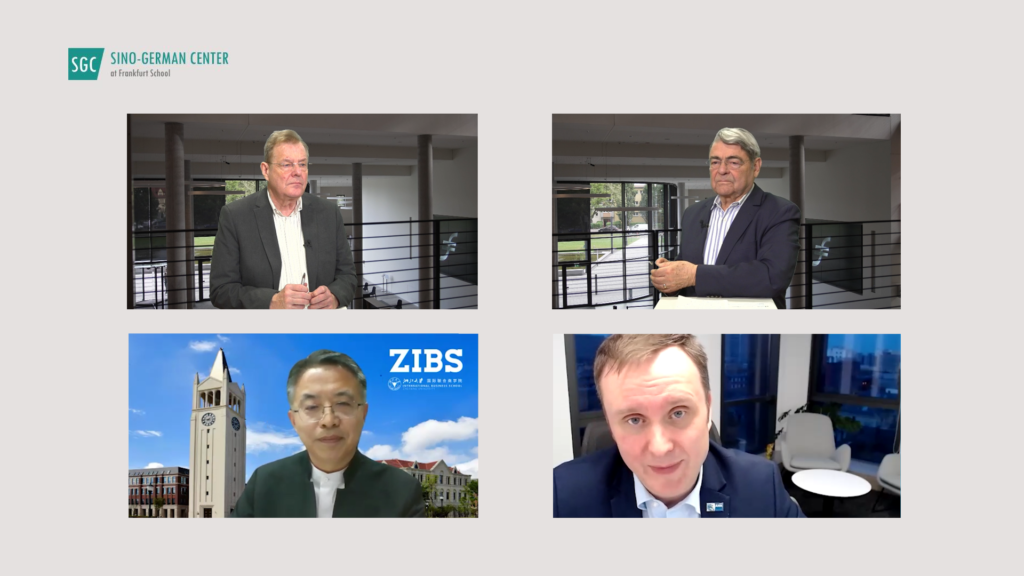
Virtual Roundtable
Outlook for China’s Economy 2024
January 23rd, 11:00 CET
Speakers:
- Volkmar Baur, China Economist at Union Investment
- Dr. Yi Xiong, Chief Economist at Deutsche Bank China
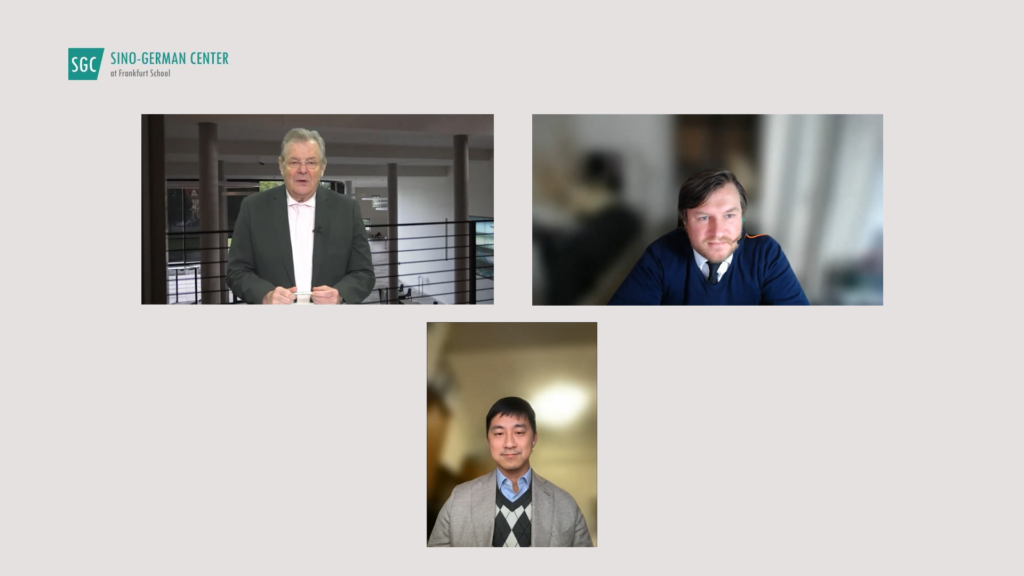
Past Research Projects
Sponsored by Dr. Hans Messer Stiftung

Understanding China’s Economy and the Consequences for Europe
SPONSERED BY THE DR. HANS MESSER STIFTUNG The research project aims to promote China expertise in Europe and Germany for students, experts as well as practitioners with a focus on the development of China’s domestic economy and its impact on the world economy. A special focus is given to the question what China’s economy differs from Western economies and how to explain its successful development in last fourth five years and what do expect for the future. It is also intended to deeply analyse the impact of the rise of China’s economy for Europe and Germany and the respective consequences for the future. The research should result in publications that cumulates in a text book about China’s economy combined with the design of a respective lecturer series and scientific colloquiums with distinguished experts.
Chinas Wirtschaft und die Konsequenzen für Europa
Das Forschungsprojekt zielt darauf ab, die China-Expertise in Europa und Deutschland für Studenten, Experten und Praktiker zu fördern, wobei der Schwerpunkt auf der Entwicklung von Chinas Binnenwirtschaft und deren Auswirkungen auf die Weltwirtschaft liegt. Ein besonderer Fokus liegt dabei auf der Frage, was Chinas Wirtschaft von westlichen Volkswirtschaften unterscheidet und wie die erfolgreiche Entwicklung in den letzten rund vier Jahrzehnten zu erklären und was für die Zukunft zu erwarten ist. Es ist auch beabsichtigt, die Konsequenzen des Aufstiegs der chinesischen Wirtschaft auf Europa und Deutschland zu analysieren. Die Forschung soll in Publikationen münden, die in einem Lehrbuch über Chinas Wirtschaft kumuliert werden sollen. Darüber aufbauen soll eine entsprechende Vortragsreihe aufgelegt und ein wissenschaftliches Kolloquien gestartet werden. Contact/Kontakt: Prof. Dr. Horst Löchel, Head Sino-German Center, Frankfurt School of Finance & Management, h.loechel@fs.de Tim Jablonski, Wissenschaftlicher Mitarbeiter am Sino-German Center, Frankfurt School of Finance & Management, t.jablonski@fs.de
Sponsored by Bundesministerium für Forschung und Bildung (BMBF)
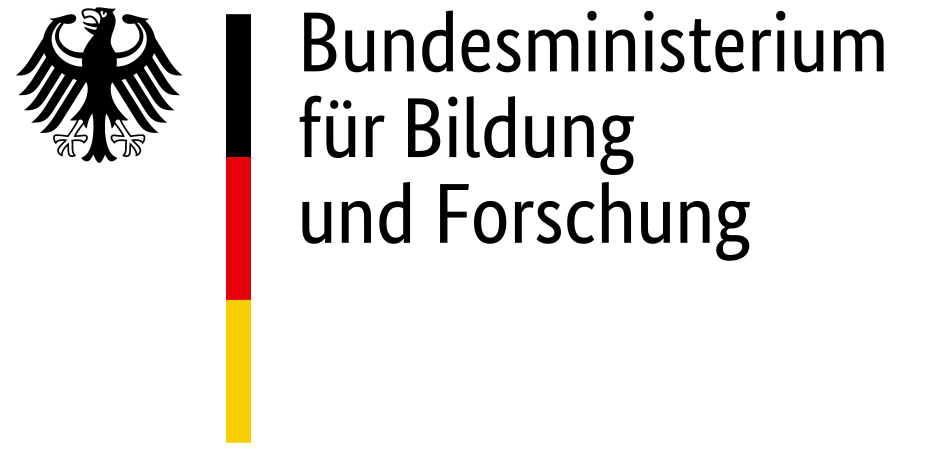
Corporate Venture Capital (CVC) as an Innovations tool for Global Technology Leadership in China
SPONSORED BY BUNDESMINISTERIUM FÜR BILDUNG UND FORSCHUNG (BMBF)
The aim of the project is to investigate the significance, structure, and effects of external innovation measures, as a tool of inorganic corporate growth of large Chinese companies (both private and state-owned) through corporate venture capital (and, by extension, through M&A) as a tool for achieving technology leadership in key industries. As a result, the project aims to expand the German and European competence about the Chinese innovation and financial system. Further, it aims to contribute to current social, economic and innovation policy developments in the People’s Republic of China.
The starting point of the project is the conviction that Germany and Europe can learn from Chinese methods of promoting innovation. In light of the Chinese “Made in China 2025” initiative and the new five-year plan, which places technology development at the center of the country’s economic policy considerations, the topic is highly relevant. Similarly, the project supports our understanding of the complex workings of innovation policy via P.R. China equity investments in key technologies. Both public and private stakeholders (e.g., investors and technology companies) from Germany and Europe will learn more about Chinese successes.
Specifically, the following scientific goals are pursued:
1. Better general understanding of CVC in China (actors, structures, processes, strategies), and in particular related to:
1. The role of State-Owned-Enterprises (SOE) as well as their investment activities in the context of Chinese innovation policy with a focus on key technologies.
2. The predictive power of VC investment for key technological sectors and developments, focusing on CVC as a potential leading indicator of China’s technological priorities.
3. The investment climate for international players in China, e.g. German or European CVCs investing in China.
2. Better general understanding of Chinese CVC activities abroad, e.g. investments by Chinese players in German technology companies, as well as in particular with a focus on:
1. The context of CVC investments by Chinese firms in Germany and Europe in key technologies.
2. CVC as a precursor to corporate acquisitions (M&A), as well as to what extent and how CVC is used as a starting point for subsequent corporate acquisitions and knowledge transfer.
3. A central work result should also be a validated data set, direct access to further local information carriers (network expansion through local partners and via established social media groups) as well as the preparation for the “China Technology Radar” based on VC data. The research results should lead to scientific articles as well as practitioner studies. Furthermore, the design of case studies for university teaching and a conference in the context of the China Europe Finance Summit are planned.
Corporate Venture Capital (CVC) als Innovations-Werkzeug für globale Technologieführerschaft in Chinа
Ziel des Projektes ist es, Bedeutung, Aufbau und Wirkungsweisen von externen Innovationsmaßnamen im Zuge der anorganischen Unternehmensentwicklung von chinesischen Großunternehmen (privatwirtschaftliche wie staatliche) durch Corporate Venture Capital (und in Erweiterung durch M&A) als Werkzeug zur Erlangung von Technologieführerschaft in Schlüsselbranchen zu untersuchen. Im Ergebnis soll der Ausbau der China-Kompetenz für Teile des deutschen und europäischen Innovations- und Finanzsystems erreicht werden sowie generell ein Forschungsbeitrag zu aktuellen gesellschafts-, sozial-, wirtschafts- sowie innovationspolitischen Entwicklungen in der Volksrepublik China
Ausgangspunkt des Vorhabens ist die Überzeugung, dass Deutschland und Europa von chinesischen Methoden der Förderung von Innovationen lernen können. Angesichts der chinesischen „Made in China 2025“ – Initiative sowie des neuen Fünf-Jahresplans, der die Technologieentwicklung in das Zentrum der wirtschaftspolitischen Überlegungen des Landes rückt, ist das Thema hoch relevant. Ebenso unterstützt das Vorhaben das förderpolitische Ziel, unser Verständnis der komplexen Wirkungsweise von Innovationspolitik über Eigenkapitalinvestitionen der V.R. China in Schlüsseltechnologien zu stärken. Sowohl öffentliche als auch private Akteure (z.B. Investoren und Technologieunternehmen) aus Deutschland und Europa sollen mehr über die chinesischen Erfolge erfahren.
Konkret werden die folgenden wissenschaftlichen Ziele verfolgt:
Besseres Verständnis von CVC in China (Akteure, Strukturen, Prozesse, Strategien) im Allgemeinen, sowie im Besonderen bezogen auf: Die Rolle von State-Owned-Enterprises (SOE) sowie ihrer Investitionstätigkeit im Rahmen der chinesischen Innovationspolitik mit Fokus auf Schlüsseltechnologien. Die prognostische Kraft von VC Investitionen für technologische Schlüsselsektoren und Entwicklungen, mit Fokus auf CVC als potentieller Frühindikator für technologische Schwerpunkte Chinas. Das Investitionsklima für internationale Akteure in China, z.B. Deutsche oder Europäische CVCs, die in China investieren. Besseres Verständnis von chinesischen CVC Aktivitäten im Ausland, z.B. Investitionen von chinesischen Akteuren in deutsche Technologieunternehmen, im Allgemeinen sowie im Besonderen mit Fokus auf: Den Zusammenhang von CVC Investitionen von chinesischen Firmen in Deutschland und Europa in Schlüsseltechnologien. CVC als Vorbote von Firmenübernahmen (M&A), sowie in welchem Umfang und wie CVC als Startpunkt für spätere Firmenkäufe und Wissenstransfer eingesetzt wird. Ein zentrales Arbeitsergebnis soll zudem ein validierter Datensatz, ein direkter Zugang zu weiteren lokalen Informationsträgern (Netzwerkerweiterung durch die lokalen Partner und über aufgebaute Social Media Gruppen) sowie die Vorbereitung für den auf VC-Daten aufbauenden “China Technologie-Radar” sein.Die Forschungsergebnisse sollen in wissenschaftlichen Aufsätzen sowie in einer Praktiker Studie münden. Darüber hinaus ist die Konzeption von Fallstudien für den Hochschulunterricht und eine Konferenz im Rahmen des China Europe Finance Summits geplant.
Kontakt/Contact:
Prof. Dr. Horst Löchel, Head Sino-German Center,
Frankfurt School of Finance & Management, h.loechel@fs.de
Prof. Dr. Michael Grote, Academic Head Frankfurter Institute
for Private Equity and M&A, Frankfurt School of Finance & Management, m.grote@fs.de
Prof. Dr. Boris Bauke, Professor for Digitalisation and Entrepreneurship
Technische Hochschule Aschaffenburg, boris.bauke@th-ab.de
SGC in the Press
News-Podcast Finanzfluss
China und die schwindende Dominanz des Westens
(3. September 2025)
Interview with DW (Deutsche Welle), 13. May 2025: Chinas Resist the First Round of Tariffs — Will It Sign a New “Purchase Agreement”?
Colloquium on China’s Economy, May 21st
Colloquium About the Future of China’s Economy at Frankfurt School
On 21 May 2025, the Sino-German Center at Frankfurt School hosted a high-level symposium on China’s economic future, marking the release of the book The Rise of China’s Economy: Past, Present, and Future by Prof. Dr. Horst Löchel and Tim Jablonski (Springer). Main speakers have been Professor Yeling Tan from Oxford University, Prof. Klaus Mühlhahn from Zeppelin University, and Prof. Löchel. Opening remarks have been held by the President of Frankfurt School, Prof. Nils Stieglitz, and representatives of the Hans and Ria Messer Foundation that generously sponsored the writing of the book. Concluding remarks have been given by Prof. Bertram Schefold from Goethe-University. Focus of the colloquium have been China’s growth model of the future. Around 30 participants from academia and business discussed the questions, moderated by Prof. Rolf D. Cremer.
The Book: https://link.springer.com/book/9783031801495
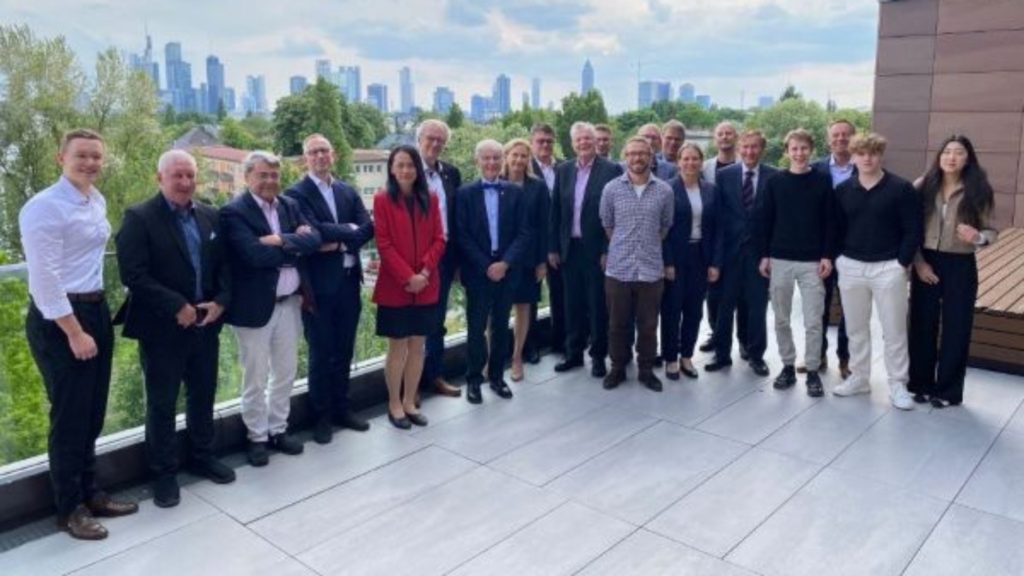
Sino-German Workshop on Climate Risk Management and Sustainability Disclosures June 11th, 2025
On 11 June 2025, the Sino-German Centre (SGC) and the International Advisory Service of Frankfurt School of Finance & Management together with the Deutsche Gesellschaft für Internationale Zusammenarbeit (GIZ), the Institute of Finance and Sustainability (IFS), and the Climate Investment and Finance Association of China Society for Environment and Science (CIFA), jointly organized the 3rd Workshop of the Sino-German Expert Dialogues on Sustainable Finance Products and Practices on May 11 at Frankfurt School.
The bilateral German-Chinese Expert Dialogue, commissioned by the German Federal Foreign Office and funded by the International Climate Initiative (IKI), was established to strengthen the climate finance policy framework, policy coordination, initiatives, market development, and practices between stakeholders from China and Germany. The workshop series facilitates knowledge sharing and peer learning among experts from both countries. This time, the event focused on Climate Risk Management and Sustainability Disclosures.
The workshop in Frankfurt will be continued with a second one in Beijing in the autumn.
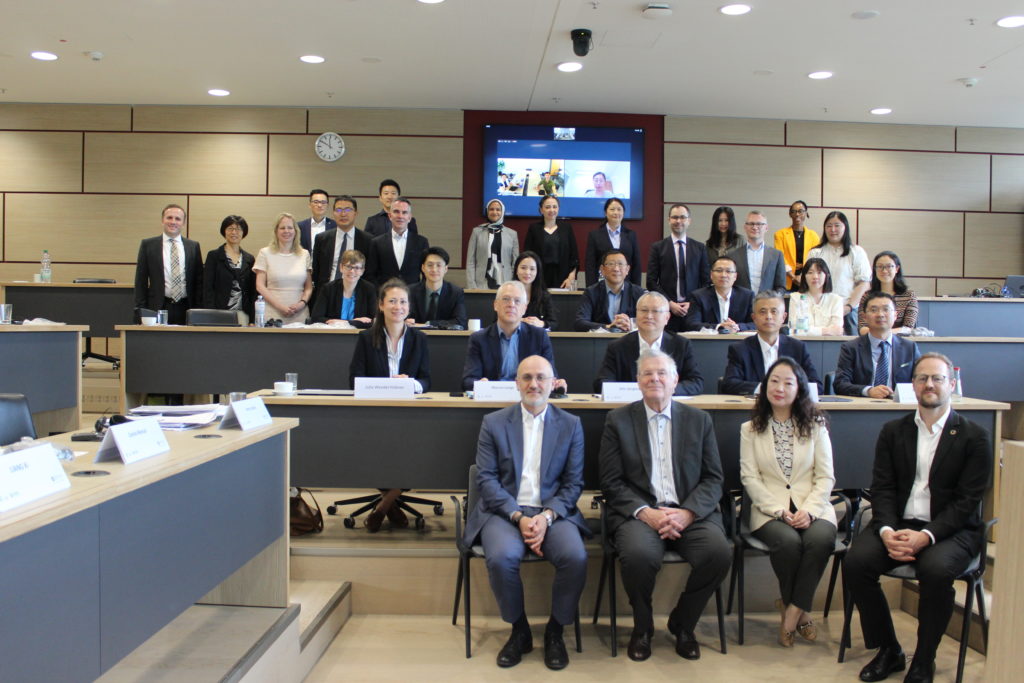
Interview zu den Auswirkungen des Zollkonflikts auf den globalen Automarkt (BZ, 18. Juli 2025).
Der Handelskrieg mit den USA animiert China zu einer wirtschaftspolitischen Kehrtwende
n-tv Podcast ‘Wirtschaft und Welt‘
Trump treibt China nach Europa
(24 April 2025)
Podcast with Prof. Löchel on ‘Wirtschaft mit Weisbach‘
China im Aufwind, Europa im Zollschock
(April 2025)
A New Growth Model for China
Interview with Southern Finance Omnimedia
(February 2025)
Statement on the transatlantic relationship at CCTV (March 2025)
Sino-German Workshop of Sustainable Finance (November 7, 2023) 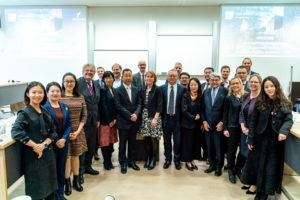
New Working Paper Germany’s Import Dependency on China (September 2023)
Joint Webinar with China.Table The Current Situation of China’s Economy (July 12)
Kommentar zu Chinas Rohstoffkontrollen (NTV News, 7 Juli 2023)
US Dollar vs RMB – Bipolar Currency Regime Possible (China Table – June 6th, 2023)
Handel und Investitionen mit China sichern unseren Wohlstand
(Tagesspiegel Background, May 31st, 2023)
RMB Internationalisation
Table.Media Digitalkonferenz with Prof. Löchel (25 April 2023 at 10:00 CEST)
Book Contribution on
Finance in Rural China
(March 2023)
Book Contribution on
Finance in Rural China
(March 2023)
Comment on Germany’s China Strategy
(ChinaTable, 10 January 2023)
High ranked finance delegation from Zhejiang province visit SGC
(June 29)
High ranked finance delegation
from Zhejiang province visit SGC
(June 29)
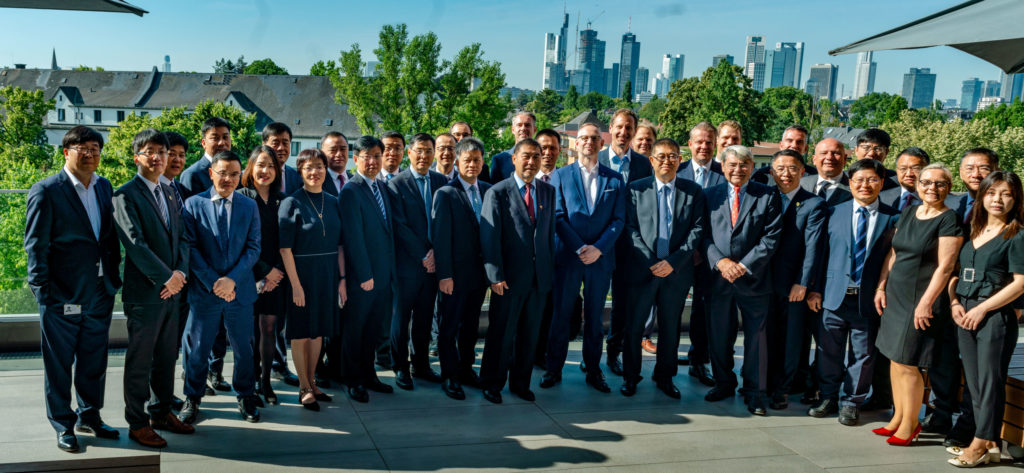
Germany’s China Strategy: The Ghost of ‘System Rival’ (China.Table – Aug 15th)
Interview with Xinhua about China’s new stimulus package
(December 2024)
Tariffs are not the answer to China Shock
The European, October 2024, pp 42-44




















































































































































Interview with Xinhua about the 3rd plenum (August 6, 2024)




















































































































































Virtual Conference
The World in 2050: The Impact of China’s Next Stage of Development and Influence
with Prof. Löchel
July 11th, 2024, Hong Kong




















































































































































Interview with CCTV
EU raises tariffs on imports of EVs from China
July 6th, 2024




















































































































































Interview mit dem Deutschlandfunk zum Besuch von Minister Habeck in China 22 Juni 2024




















































































































































Das Gespenst chinesischer Überkapazitäten Frankfurt Allgemeine Zeitung (Only available in German) 28 Mai 2024




















































































































































Interview mit ChinaHirn über chinesische Überkapazitäten 21 Juni 2024




















































































































































Podcast mit der DW zum Thema: Chinesische Überkapazitäten (Only available in German) 31 Mai 2024
German Business with China China Daily (February 2024)




















































































































































Interview with Xinhua about European Investments in China (January 2024)




















































































































































Presentation
THE RISE OF CHINA AND THE CONSEQUENCES FOR THE WEST (23 November 2022)
New Lecture at Frankfurt School: Understanding China’s Economy
Interview with Phoenix Television about the visit of Chancellor Scholz in China
(12 November 2022)
Podcast with Horst Löchel: Doing Business in China
(September 2022)
Interview with Chinese International Radio Station ‘World Today to the EU-China trade talks‘
(20 July 2022)
Interview on FDI’s to ChinaXinhua | 2 May 2022
Comment on the Eu-China SummitARD Tagesthemen24 | April 2022
German language
Comment on the EU-China Summit Deutschlandfunk-Radio | April 2022
Interview with DER AKTIONÄR TV about China – Russia Relationship | March 2022
Interview with Chinese Radio Station ‚World Today‘ about the European Chip Act | February 2022
Governance

Executive Board
In the Executive Board are representitives of the State of Hessen, the Deutsche Gesellschaft für Internationale Zusammenarbeit, Frankfurt School of Finance & Management, J. W.Goethe-University and others elected by General Assembly.
- Prof. Dr. Horst Löchel, Co-Chairman, Professor of Economics, Frankfurt School of Finance & Management, Frankfurt
- Thorsten Giehler, Head of the Economy, Employment & Social Development Department, Deutsche Gesellschaft für International Zusammenarbeit (GIZ)
- Prof. Dr. Phillipp Böing, Goethe University and ZEW
- Marco Kreuter, Director General Economic Sector, Financial Services, Exchanges, Ministry of Economics, Energy, Transport and Housing of the State of Hessen, Wiesbaden
- Prof. Dr. Rüdiger von Rosen, Honorary Professor of J. W. Goethe University
Board of Trustees
The Board of Trustees comprises of the Ministry of Economics of the State of Hessen, the Deutsche Gesellschaft für Internationale Zusammenarbeit, Frankfurt School of Finance & Management, J. W. Goethe University as well as the International Business School & Academy of Zhejiang University, Hangzhou.
Prof. Dr. Ben Shenglin, Dean, International Business School & Academy of Internet Finance, Zhejiang University, Hangzhou Prof. Dr. Rainer Klump, Executive Director of the House of Finance, J. W. Goethe University, Frankfurt Thorsten Schäfer-Gümbel, Spokesman of the Board, Deutsche Gesellschaft für Internationale Zusammenarbeit (GIZ) GmbH, Eschborn Umut Sönmez, State Secretary, Energy, Transport and Housing of the State of Hessen, Wiesbaden Prof. Dr. Nils Stieglitz, President, Frankfurt School of Finance and Management, Frankfurt


Steering Committee
Our Team
Dr. Horst Löchel is Professor of Economics at Frankfurt School of Finance & Management, and MBA Programme Director. He is also a Visiting Professor at the China Europe International Business School (CEIBS) and member of the board of directors at the Shanghai International Banking and Finance Institute (SIBFI). Professor Löchel teaches and researches with a focus on China.
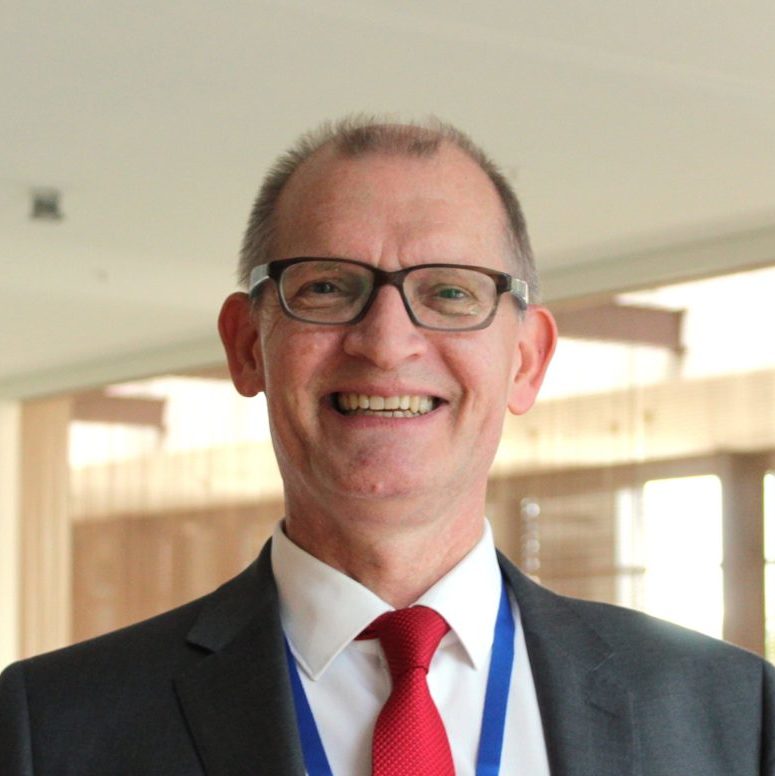
Thorsten Giehler is Head of the Economy, Employment & Social Development Department in the Deutsche Gesellschaft für Internationale Zusammenarbeit (GIZ). He has worked for 15 years in Beijing as GIZ Chief Representative in East Asia and as programme manager of the Sino-German financial sector reform programme. He is an agricultural and development economist by training and has published various books on East-West relations and rural finance.
Ilka Kranefuß has been working in marketing and corporate communications for many years and supports the SGC in the organization of events.

